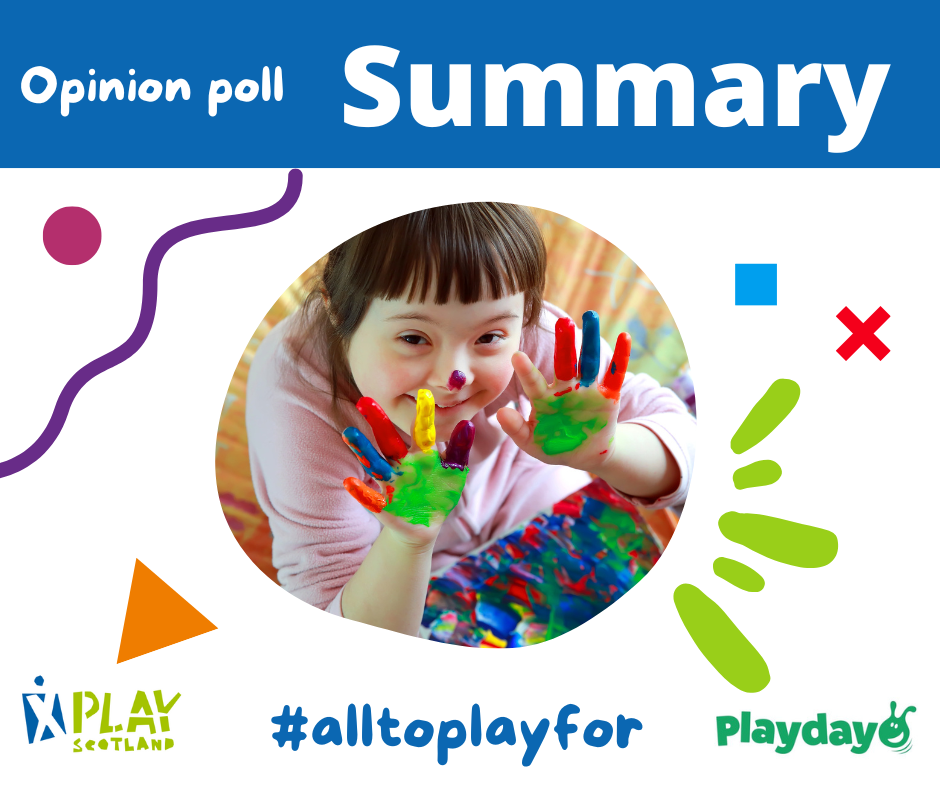The theme of 2022’s Playday was All To Play For – building play opportunities for all children. The aim of this year’s theme was to highlight that play is for everyone. At Play Scotland, we know that play happens everywhere, every day and is every child and young person’s right under Scots law. However, it is important to us to know our members’ and followers’ thoughts about play in Scotland.
In August, we informally, and unscientifically, asked five simple questions on social media and through a short questionnaire.
Almost 70% of respondents thought that children and young people in Scotland didn’t have the freedom to play where they lived in Scotland! Comparatively, less than 10% of people who felt children definitely did have the freedom to play where they live in Scotland. One Twitter user commented “I’m quite surprised how many people think ‘mostly’”
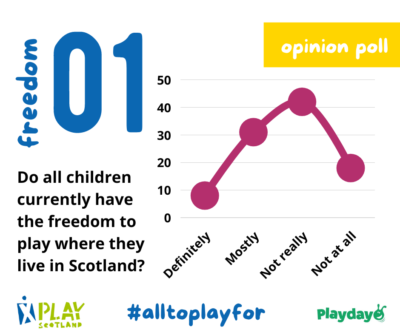
Interestingly, nobody thought that ‘money’ was barrier to play, yet two thirds cited safety as the number one limit to children’s play.
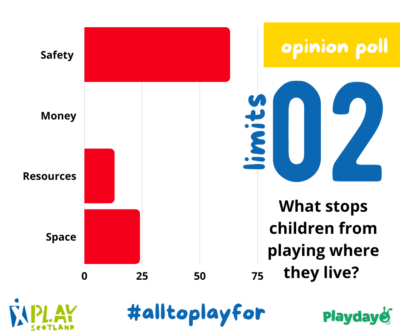
- “Parents don’t feel safe about letting their children out in their area”.
- “Safety of area, alcohol/drug misuse. Crime, gangs”
- “Many housing estates are built without accessible areas to play and we still see the ‘no ball games’ signs and adults ‘huffing and puffing’ about kids playing games on their streets”.
- “Traffic, people complaining, lack of space, parks, etc full of needles/broken glass/ dog poo. Dogs running about. Unable to access spaces”.
Respondents also commented on the lack of dedicated outdoor play spaces or shortage of indoor halls to rent for baby and toddler groups. There were concerns that play equipment is not properly designed for all children, isn’t adequately maintained and is subject to vandalism.
It is no surprise that 3/5 people thought that Covid-19 and the restrictions of the past few years has had a negative effect on children’s play. 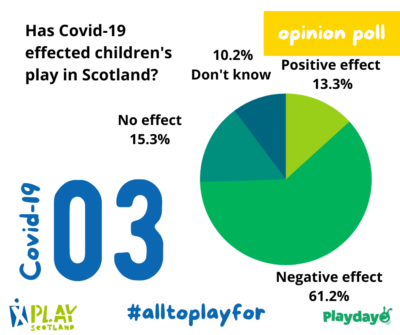
- “Children’s social interactions have definitely been impacted how children play, with some children struggling in confidence in their own creativity”
- “Children were left with no designated spaces to play during the pandemic”
- “The pandemic has only further encouraged children to stay at home”
- “I feel children have had a huge impact from Covid being that for two years the only social interaction they had was their family no way to build positive relationships for themselves”
However, some were able to find positives with the restrictions for some children and their families:
- “Although unable to go out to play during covid, I’ve found Children slipped back into play with ease”
- “I think it can be either way some children have benefited from extra play time and more time outside and other children have been impacted and playing more solo or lost confidence”.
- “They’ve had to learn to live and play in their own area. Imagination is the one thing they’ve had to learn instead of being taken places”
- “Can only speak for own family but we spent more time outdoors exploring since lockdowns”
Three-quarters of respondents said that the cost-of-living crisis is having negative effect on children’s play.
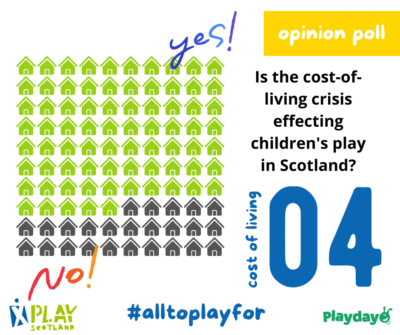
- “More families in poverty. As the cost-of-living rises, EVERYTHING gets harder”
- “Many services have a cost to them, even if its 50p, some families have 4+ children so it all adds up. The need for play with no cost is so important”
- “The less funding there is for councils, I think play areas in local areas are bottom of the list for spending. To have more play areas is good at this time because parents don’t have to spend money to get places for their kids to play when it’s on their doorstep. Schools are doing more in this area to ensure kids can play at school, but there is very little being done outside school areas”
- “Mental health impacted meaning parents not motivated to take children out”.
- “Bigger parks have many options for Ice cream sweets juice many can’t afford. But no areas to fill up your water bottles for free”.
However, as with Covid-19 restrictions, some respondents were able to look at the cost-of-living crisis and its effect on children’s play from a positive angle:
- “Play is free!”
- “In some ways, I think it could be turned into a positive. I think we could show families that children don’t need the huge expensive toys, day trips etc. That actually being taken to spaces, green or otherwise but safe spaces, where they can learn to play, together, alone, is exactly how they learn, and they grow. Not just physically but emotionally as well.”
Almost half of respondents said that cleaner, greener spaces would help make play more inclusive for all children. Closely followed by the need for improved equipment, especially for disabled children.
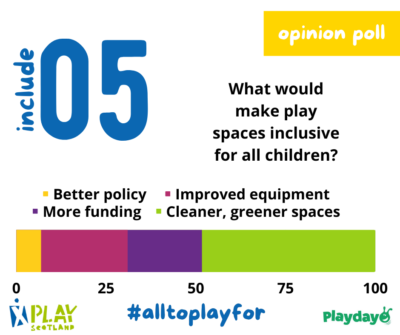
- “Accessibility should be high priority, not just for things like wheelchairs and autism but for any range of differing needs that might appear”
- “Clean spaces, not necessarily green spaces but clean”
- “All parks should be inclusive parks in ideal world or have added equipment, offer visual support and signage etc in common languages in area. Being open and easily accessible include lose parts if appropriate and safe for the space”
- “Having open, green spaces and quality parks in neighbourhoods which are free”
We would love to keep this conversation going, are there any surprises in these responses? Do you have you anything to add?
Send us a message on Twitter, Facebook, or Instagram to share your views about children’s play in Scotland.

